|
|
|
Sort Order |
|
|
|
Items / Page
|
|
|
|
|
|
|
| Srl | Item |
| 1 |
ID:
132531


|
|
|
|
|
| Publication |
2014.
|
| Summary/Abstract |
Afghanistan has been the global epicenter of heroin production for the past decade. Heroin networks and drug lords present a principal impediment to security, state building, and democratic governance. Beyond the national boundaries, Afghan-originated heroin creates enormous challenges for international security by financing terrorism, instigating corruption, killing nearly 100,000 users worldwide every year, undermining public order, and debilitating economic development. The devastating impacts of the Afghan heroin trade have spilled over into Southwest Asia, Central Asia, Russia, China, the Balkans, and Europe. Because Turkey stands on the shortest transit pathway between Southwest Asia and Europe, it is intensively exposed to illicit flows of Afghan heroin along the Balkan Route. Transnational crime syndicates have been exploiting Turkish territories for decades for the purpose of trafficking heroin to European markets. This paper discusses Afghan heroin as an international security conundrum. It further seeks to explore the dimensions of the threat in Turkey, new patterns in heroin trafficking, and profiles and operation modes of transnational syndicates. The analyses are based upon the scrutiny of important case files, national seizure database, and annual KOM provincial questionnaires. In conclusion, the paper puts forward policy recommendations for security elites both in Turkey and in other states affected by the illicit trade of Afghan heroin.
|
|
|
|
|
|
|
|
|
|
|
|
|
|
|
|
| 2 |
ID:
123456
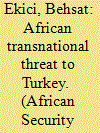

|
|
|
|
|
| Publication |
2013.
|
| Summary/Abstract |
Africa has emerged as a strategic location for transcontinental narcotics trade. Particularly the West African subcontinent has turned into a cocaine warehousing and trans-shipment hub along the way to the European underground markets. At this juncture, African drug networks (ADNs) began to play a momentous role in global drug trade, and pose a considerable threat to international security, as they operate in more than 80 countries. The United Nations Office on Drugs and Crime, Interpol, and Europol perceive ADNs as one of the primary issues in international counter-narcotics policy. These agencies have launched several multilateral initiatives to contain the West African threat. None of these initiatives, however, retarded the expansion of the problem. Indeed, the containment efforts turned out to be quite embryonic. The ADNs eventually entered the Turkish market by the early 2000s. West African drug networks (WADNs) in particular have begun to operate within Turkey extensively, often supplying and distributing drugs. The gravity of the threat became ever more serious by 2012. The upsurge of the new threat has compelled the Turkish drug-law enforcement agencies to adopt new policies and counter-strategies. These policies have to be based upon proper strategic analysis of the threat. This paper seeks to address the need for a threat assessment of ADNs. It investigates the dimensions of the problem, profiles the members of WADNs, their modes of operation, and the factors that compelled them to exploit the illicit Turkish drug markets. The analyses are based upon the scrutiny of 227 narcotic interdictions files and statements from the African individuals in these case files. The paper concludes by presenting policy implications and recommendations for the Turkish security and foreign-policy institutions to cope with this impending threat.
|
|
|
|
|
|
|
|
|
|
|
|
|
|
|
|
| 3 |
ID:
068667
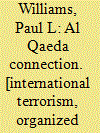

|
|
|
|
|
| Publication |
New Delhi, Viva Books, 2006.
|
| Description |
280p.
|
| Standard Number |
813090375X
|
|
|
|
|
|
|
|
|
|
|
|
Copies: C:1/I:0,R:0,Q:0
Circulation
| Accession# | Call# | Current Location | Status | Policy | Location |
| 051129 | 303.625/WIL 051129 | Main | On Shelf | General | |
|
|
|
|
| 4 |
ID:
133689
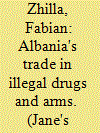

|
|
|
|
|
| Publication |
2014.
|
| Summary/Abstract |
With a new movement attempting to get to grips with organized crime in Albania. Fabian Zhilla examines trends in drug trafficking into Europe and the growth in contract killings arising from a developing market in arms and explosives.
|
|
|
|
|
|
|
|
|
|
|
|
|
|
|
|
| 5 |
ID:
080433
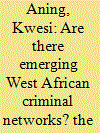

|
|
|
|
|
| Publication |
2007.
|
| Summary/Abstract |
This paper situates discussions about emerging African Criminal Networks (ACN) within Ghana specifically, and West Africa generally, and seeks to present the initial results of an empirically based study on the activities of transnational organised criminal (TOCs) groups in Ghana. The paper argues that the nature of state and statehood in Africa and its inability to establish effective regulatory mechanisms contributes to the rise of these particular types of criminal groups. It begins by conceptualising the place of Ghanaian and West African criminal groups within the framework of international crime. Furthermore, it undertakes an in-depth analysis of three types of crimes; namely computer and internet crime, drug trafficking and (artisanal) small arms manufacture and smuggling in Ghana. By applying a set of standard variables and criteria, the paper evaluates the growth of TNCs in these three issue-areas and how such activities potentially undermine public institutions like the Ghana Police Service (GPS), customs, excise and preventive services (CEPS), judiciary, banking and political parties and political institutions in Ghana. Finally, it seeks to offer an explanatory framework for the growth and acceptance by local communities of the activities of organised crime in Ghana by situating this within a cultural ethos and the social welfare roles played by those involved in such crimes
|
|
|
|
|
|
|
|
|
|
|
|
|
|
|
|
| 6 |
ID:
055708


|
|
|
| 7 |
ID:
046836
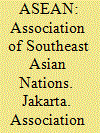

|
|
|
|
|
| Publication |
Jakarta, Association of Southeast Asian Nations, 2003.
|
| Description |
148p.
|
|
|
|
|
|
|
|
|
|
|
|
Copies: C:1/I:0,R:0,Q:0
Circulation
| Accession# | Call# | Current Location | Status | Policy | Location |
| 046861 | 341.247306/ASE 046861 | Main | On Shelf | General | |
|
|
|
|
| 8 |
ID:
047194
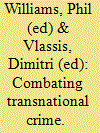

|
|
|
|
|
| Publication |
London, Frank Cass, 2001.
|
| Description |
390p.
|
| Standard Number |
0714651567
|
|
|
|
|
|
|
|
|
|
|
|
Copies: C:1/I:0,R:0,Q:0
Circulation
| Accession# | Call# | Current Location | Status | Policy | Location |
| 044702 | 364.1/WIL 044702 | Main | On Shelf | General | |
|
|
|
|
| 9 |
ID:
138896
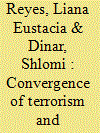

|
|
|
|
|
| Summary/Abstract |
This article examines the convergence among ethnic groups, narco-traffickers, insurgents, and terror organizations in Central Asia. It analyzes the lucrative business of drug trafficking and the diffusion of globalization, which have undoubtedly brought these once disparate groups together. It will explore how the increasing movement of illicit goods and people, proliferation of transportation technology, growing infrastructure, cooperative ethnicities, as well as a shared need for funding, have provided these groups with an opportunity to consolidate their efforts in ways that were not possible in the past.
|
|
|
|
|
|
|
|
|
|
|
|
|
|
|
|
| 10 |
ID:
056037
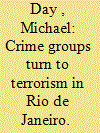

|
|
|
| 11 |
ID:
061761
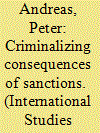

|
|
|
| 12 |
ID:
117956
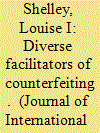

|
|
|
|
|
| Publication |
2012.
|
| Summary/Abstract |
Counterfeits may be the least policed form of transnational crime, although the profits from their sale total in the billions of dollars annually. The counterfeits traded by transnational criminals can be subdivided into two categories: those that merely represent copyright infringement and those that cause harm to life and society. In the first category are such counterfeits as clothing, purses, other consumer goods, and DVDs and other forms of intellectual property. In the second category are counterfeit pharmaceuticals, food, wine, cigarettes, and spare parts. Both forms of counterfeit, however, can be exploited by terrorists because of the low risk and high profits associated with this commerce that makes this trade more dangerous. The article will focus on the actors associated with this illicit trade, as well as the supply, the demand, and the limited law enforcement response. Particular focus will be paid to the counterfeits that cause harm to human life.
|
|
|
|
|
|
|
|
|
|
|
|
|
|
|
|
| 13 |
ID:
046228
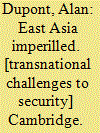

|
|
|
|
|
| Publication |
Cambridge, Cambridge University Press, 2001.
|
| Description |
xiv, 336p.
|
| Series |
Cambridge Asia-Pacific studies
|
| Standard Number |
0521010152
|
|
|
|
|
|
|
|
|
|
|
|
Copies: C:1/I:0,R:0,Q:0
Circulation
| Accession# | Call# | Current Location | Status | Policy | Location |
| 046032 | 363.7/DUP 046032 | Main | On Shelf | General | |
|
|
|
|
| 14 |
ID:
087466
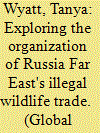

|
|
|
|
|
| Publication |
2009.
|
| Summary/Abstract |
The Russian Federation is a source of wildlife and wildlife products that fuel the vast, and often overlooked, illegal wildlife trade that takes place around the globe. Out of the many illicit animal and plant trades, two of these black markets - the illegal fur trade and the illegal falcon trade - are used in this article to explore the organization of this illicit activity in Russia Far East. Using interviews from Russian and other wildlife trade experts, structural frameworks are established for each of these illegal wildlife markets.
|
|
|
|
|
|
|
|
|
|
|
|
|
|
|
|
| 15 |
ID:
052854
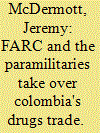

|
|
|
| 16 |
ID:
066307
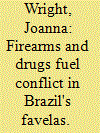

|
|
|
| 17 |
ID:
086192
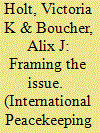

|
|
|
|
|
| Publication |
2009.
|
| Summary/Abstract |
This article examines the links between peace operations and combating transnational organized crime. It argues that while UN Security Council mandates direct UN missions to support establishing the rule of law in states that host peace operations, their role in addressing organized crime is more implicit than explicit. This article notes, however, that UN panels of experts, small fact-finding teams appointed to monitor targeted sanctions, may offer insight into, and options for addressing, such criminal networks. Panel findings and recommendations, however, are not integrated with related UN efforts to build the rule of law. This lack of integration reflects a need, on the part of the UN and its member states, to address better the ability of peace operations, UN panels of experts, and other tools for peacebuilding to contribute more effectively to fighting spoiler networks and organized crime.
|
|
|
|
|
|
|
|
|
|
|
|
|
|
|
|
| 18 |
ID:
150452
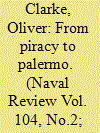

|
|
|
| 19 |
ID:
160335
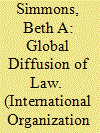

|
|
|
|
|
| Summary/Abstract |
In the past few decades new laws criminalizing certain transnational activities have proliferated: from money laundering, corruption, and insider trading to trafficking in weapons and drugs. Human trafficking is one example. We argue that criminalization of trafficking in persons has diffused in large part because of the way the issue has been framed: primarily as a problem of organized crime rather than predominantly an egregious human rights abuse. Framing human trafficking as an organized crime practice empowers states to confront cross-border human movements viewed as potentially threatening. We show that the diffusion of criminalization is explained by road networks that reflect potential vulnerabilities to the diversion of transnational crime. We interpret our results as evidence of the importance of context and issue framing, which in turn affects perceptions of vulnerability to neighbors' policy choices. In doing so, we unify diffusion studies of liberalization with the spread of prohibition regimes to explain the globalization of aspects of criminal law.
|
|
|
|
|
|
|
|
|
|
|
|
|
|
|
|
| 20 |
ID:
000703
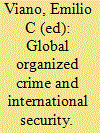

|
|
|
|
|
| Publication |
Aldershot, Ashgate, 1999.
|
| Description |
xi,206p.
|
| Standard Number |
1840149590
|
|
|
|
|
|
|
|
|
|
|
|
Copies: C:1/I:0,R:0,Q:0
Circulation
| Accession# | Call# | Current Location | Status | Policy | Location |
| 042093 | 364.106/VIA 042093 | Main | On Shelf | General | |
|
|
|
|
|
|
|
|
|